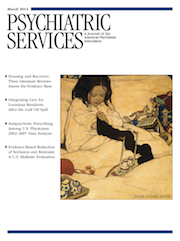Characteristics of U.S. Suicide Decedents in 2005–2010 Who Had Received Mental Health Treatment
Abstract
Objective
To inform suicide prevention efforts in mental health treatment, the study assessed associations between recent mental health treatment, personal characteristics, and circumstances of suicide among suicide decedents.
Methods
Data from 18 states reporting to the National Violent Death Reporting System between 2005 and 2010 (N=57,877 suicides) were used to compare circumstances among adult decedents receiving any or no type of mental health treatment within two months before death.
Results
Of suicide decedents, 28.5% received treatment before suicide. Several variables were associated with higher odds of receiving treatment, including death by poisoning with commonly prescribed substances (adjusted odds ratio [AOR]=3.04, 95% confidence interval [CI]=2.84–3.26), a history of suicide attempts (AOR=2.77, CI=2.64–2.90), depressed mood (AOR=1.69, CI=1.62–1.76), and nonalcoholic substance abuse or dependence (AOR=1.13, CI=1.07–1.19).
Conclusions
For nearly a third of all suicide decedents, better mental health care might have prevented death. Efforts to reduce access to lethal doses of prescription medications seem warranted to prevent overdosing with commonly prescribed substances.



